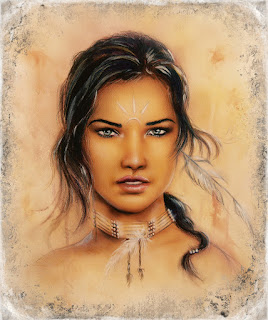Last week's post stirred up more interest than it had any right to, particularly on the subject of Native ancestry. So this week, I'm going to try to explain why you may not have an Indian great-grandma, after all.
 |
| Purely for illustrative purposes! Don't @ me! JosefKlopacka | Deposit Photos |
For starters, let's talk about the Cherokee. Ancestry.com says that "so many people falsely claim to have a Cherokee great-grandmother that it’s been deemed an anthropological phenomenon." In a 2015 article for Slate, Gregory D. Smithers said this is particularly prevalent in the South, and there are a few reasons why. First, the Cherokee tried hard to accommodate White settlers in their lands during the 17th and 18th centuries, and one of the ways they did that was to allow intermarriage: "we know that Cherokees viewed intermarriage as both a diplomatic tool and as a means of incorporating Europeans into the reciprocal bonds of kinship." So it's not outside the realm of possibility for a White person today to claim Cherokee heritage.
But: Southerners fighting for the preservation of their own way of life --yup, that would be slavery -- kind of came to admire the Cherokee, after they'd been forcibly moved to Oklahoma via the Trail of Tears, for the way they had resisted leaving. Smithers again: "Throughout the South in the 1840s and 1850s, large numbers of whites began claiming they were descended from a Cherokee great-grandmother. That great-grandmother was often a 'princess,' a not-inconsequential detail in a region obsessed with social status and suspicious of outsiders. By claiming a royal Cherokee ancestor, white Southerners were legitimating the antiquity of their native-born status as sons or daughters of the South, as well as establishing their determination to defend their rights against an aggressive federal government, as they imagined the Cherokees had done. These may have been self-serving historical delusions, but they have proven to be enduring."
They're also racially suspect. So if you don't want to be a racist jerk, how do you prove your family legend?
A lot of folks think DNA testing is the answer, but it's not guaranteed to give you the result you're looking for. That's mostly because of the way DNA is inherited. As Gregor Mendel discovered in his genetic experiments with pea plants, children don't inherit all of their parents' DNA -- they get half, more or less, from each. And the farther back in your family tree you go, the less of each grandparent's DNA you inherit. So even if you do have Native ancestry, you may not have inherited a segment of DNA that expresses it.
Also, commercial DNA testing services might miss your Native DNA. Ancestry explains it this way: "The AncestryDNA test surveys over 700,000 locations in your DNA, but there is still a chance that we missed evidence of Indigenous American DNA. This is because you may have inherited genetic markers that AncestryDNA does not use to identify Indigenous American ethnicity. Additionally, some Native American communities are underrepresented in genetics research. This is largely due to tribal communities being rightfully distrustful because of centuries of extractive and exploitative research practices."
That underrepresentation brings us to the odious "blood quantum". Between the late 19th and early 20th centuries, the U.S. government instituted a system for determining membership in a Native tribe that was based on how much "Indian blood" you possessed, and that was determined by which of your ancestors, if any, were enrolled members of the tribe at the turn of the 20th century. Not that the feds cared, but Natives count their kin differently; they don't necessarily use direct descent. Moreover, the reason the government instituted the system was to dismantle the reservations. The thinking went that by giving each enrolled family an allotment of land of their own, it would free up more land for White settlers and, as a bonus, force the Indians to become more, y'know, "civilized". So you can see why some Native Americans wouldn't want to have their DNA tested.
So how can you prove you have Cherokee ancestry?
I have for you a link to an article called "So Your Grandmother Was a Cherokee Princess?" It was published by the Cherokee Cultural Society of Houston in 1995, and it outlines a series of steps you can take to locate your ancestor. I had to go to the Wayback Machine to find it. Here you go:
https://web.archive.org/web/20160114120349/http://www.powersource.com/cherokee/gene.html
Good luck!
***
As for my own supposed Native roots: I haven't heard back yet from the Canadian government, and it likely won't matter anyway. After reviewing a number of additional hints from Ancestry, I realized I was researching the wrong bunch of Terwilligers. Moreover, my third-great-grandmother was married twice; my second-great-grandmother was from her first marriage, and that guy's last name was Fobare, or maybe Fobear or Forbear. The original name was probably Foubert, and I think he was from what's now Quebec. The name changed when they immigrated to Michigan.
The area where they settled -- Oceana County, Michigan -- was Odawa territory, so I could be Odawa. But if the Native connection happened in Quebec, I could be Huron or Cree or Algonquin. Or something else.
I may never know. But I still have a few leads to follow up on. I'll let you know if any of them pan out.
***
These moments of "Indian princess" blogginess have been brought to you, as a public service, by Lynne Cantwell. Stay safe! And happy Father's Day!

1 comment:
wow fascinating stuff 👌 keep us posted on what you find out
Post a Comment